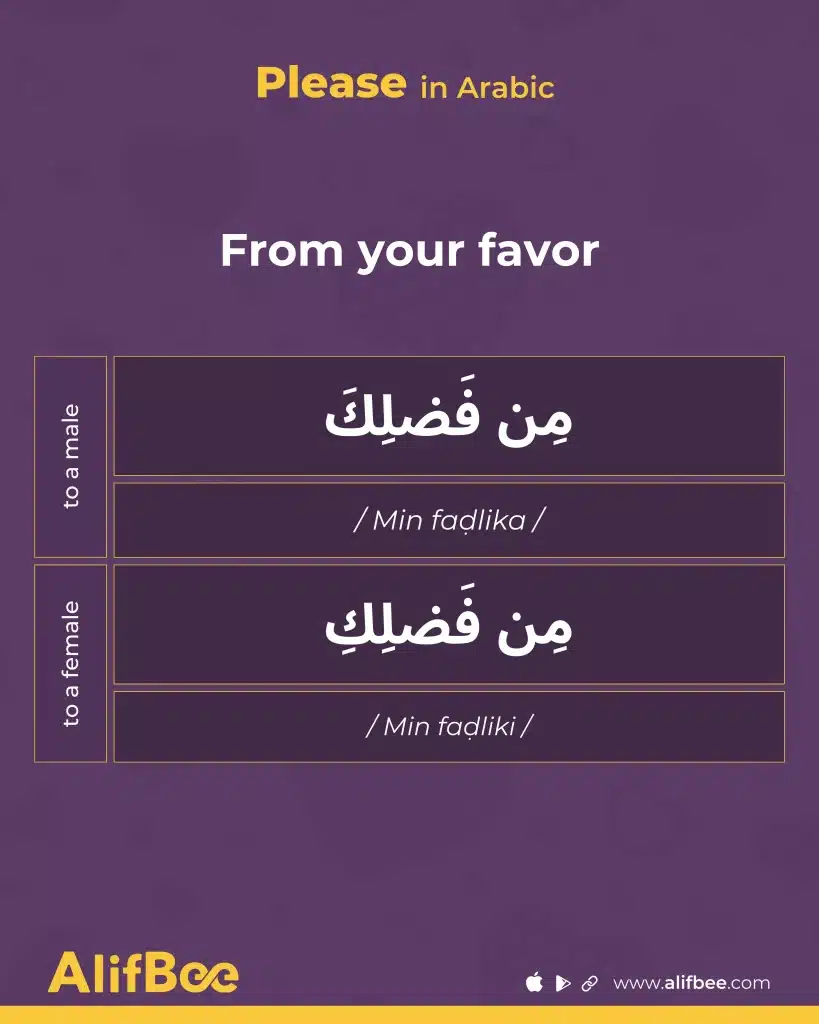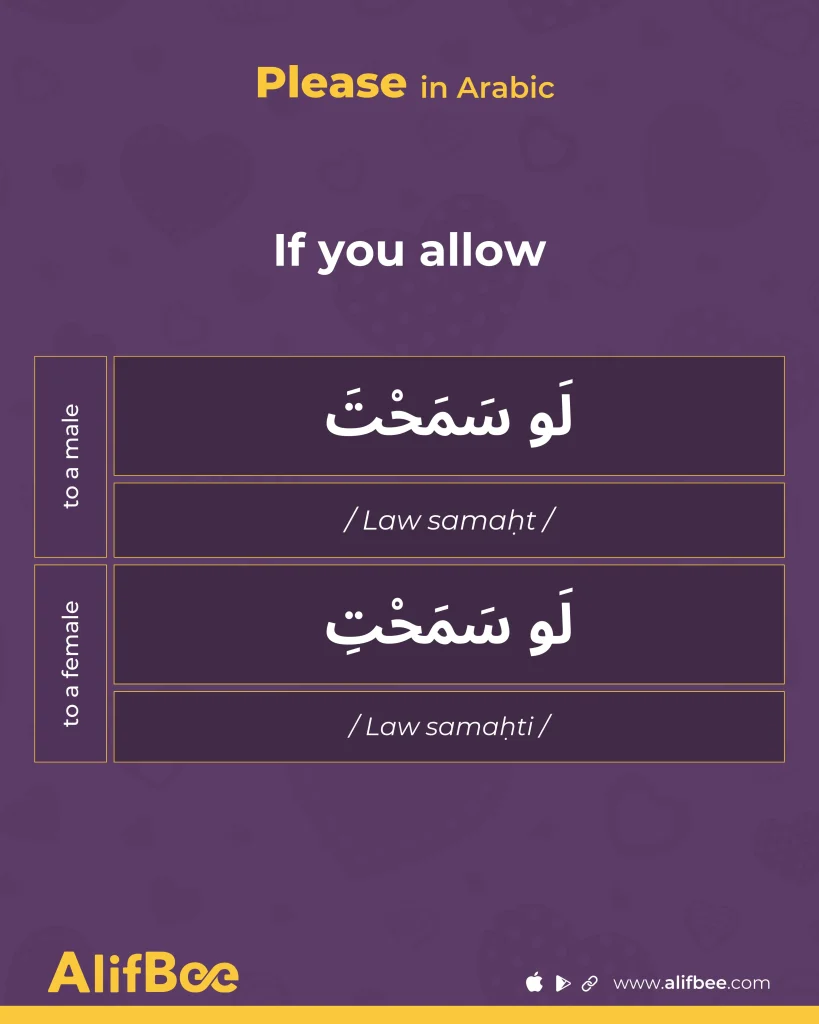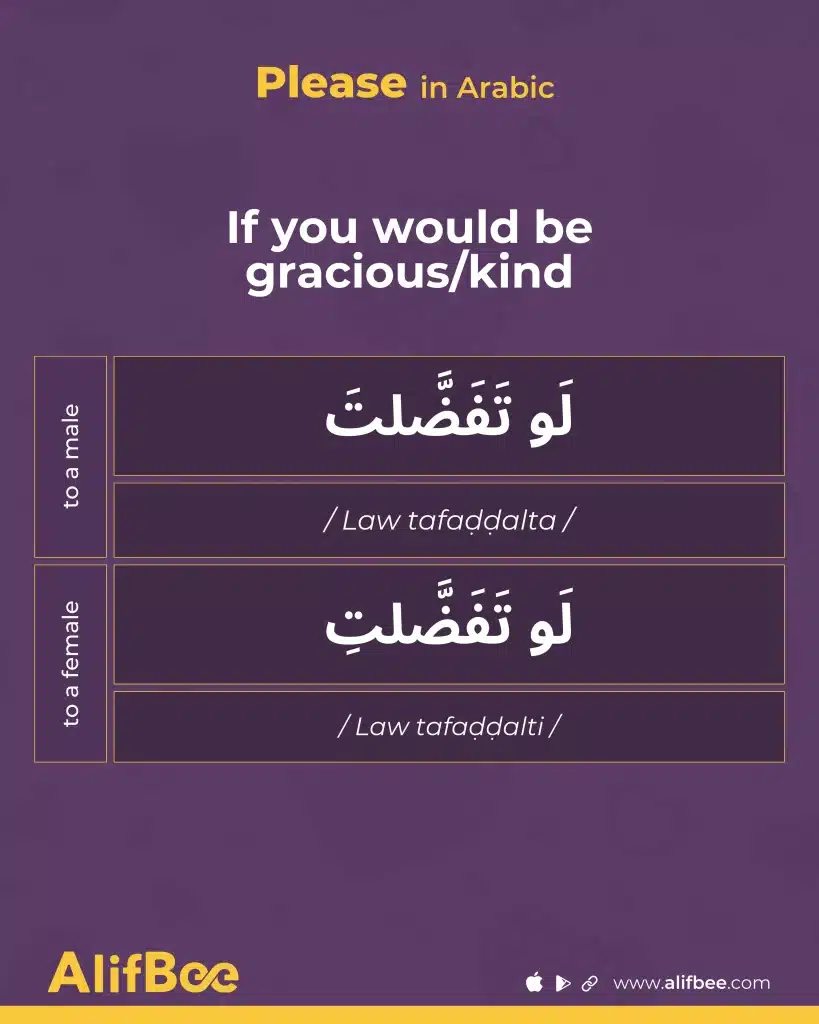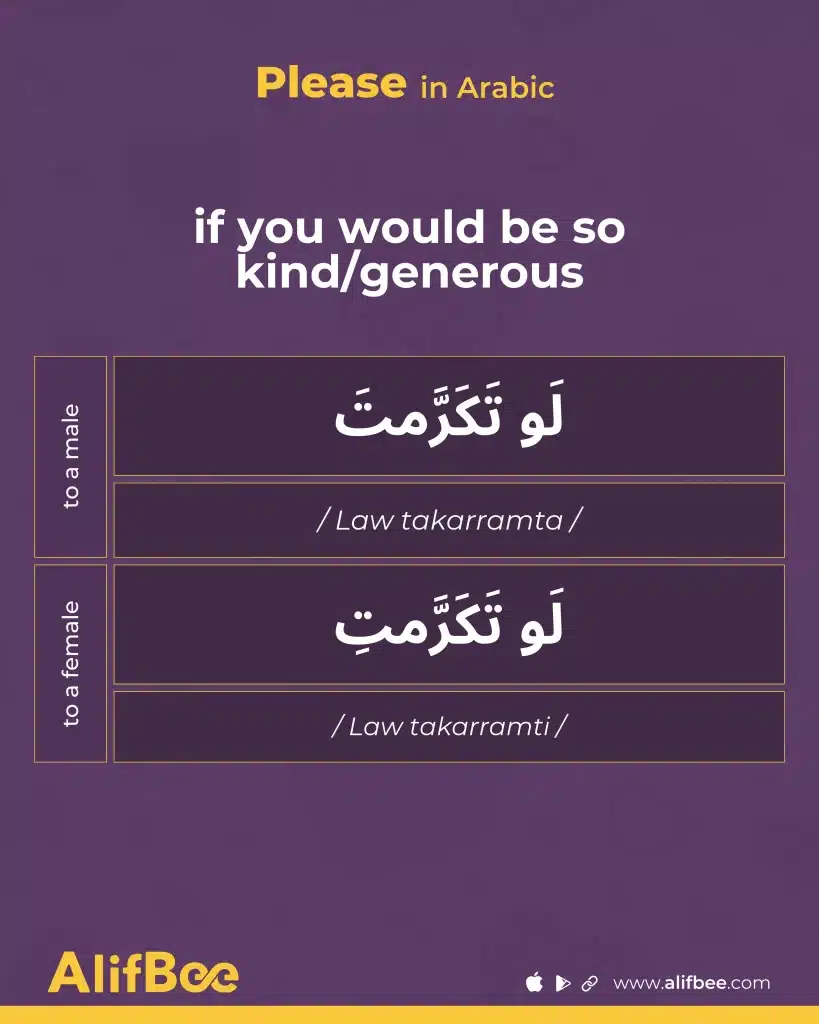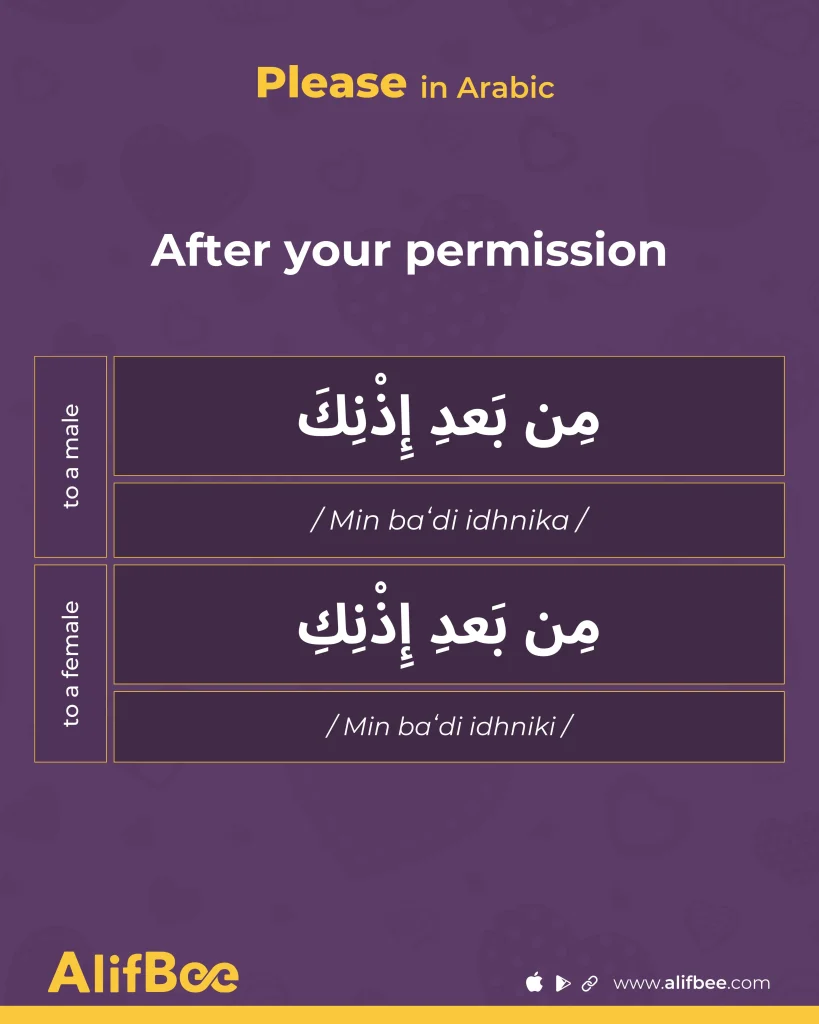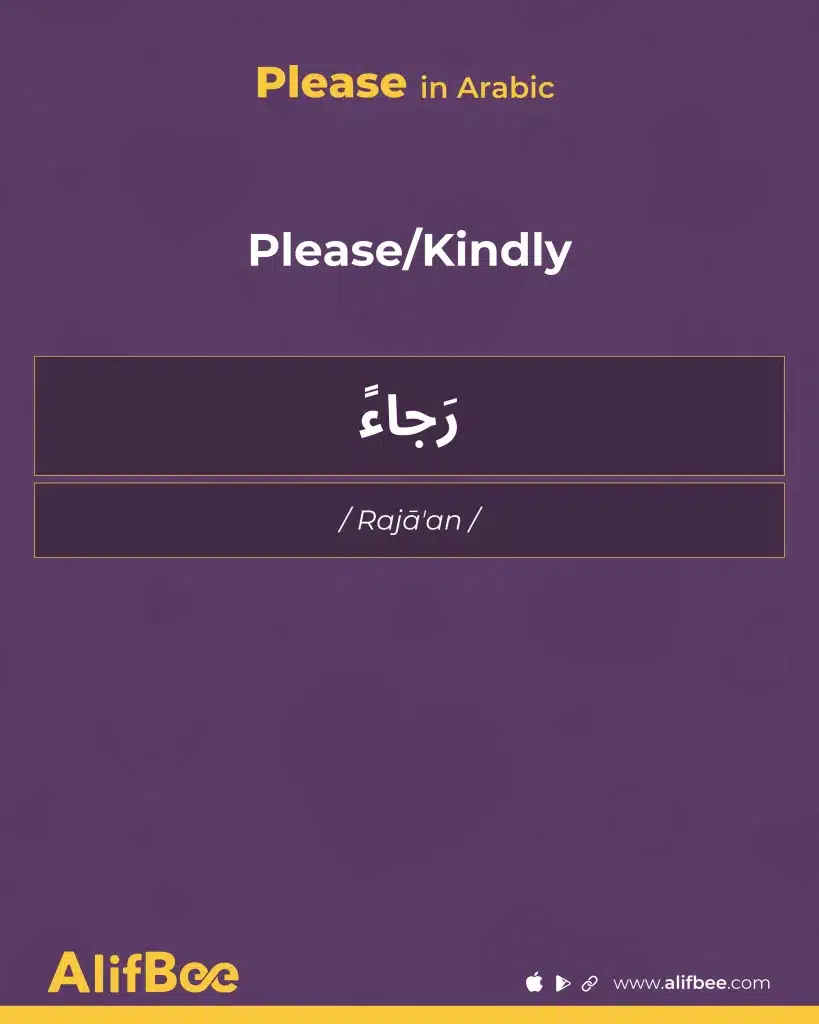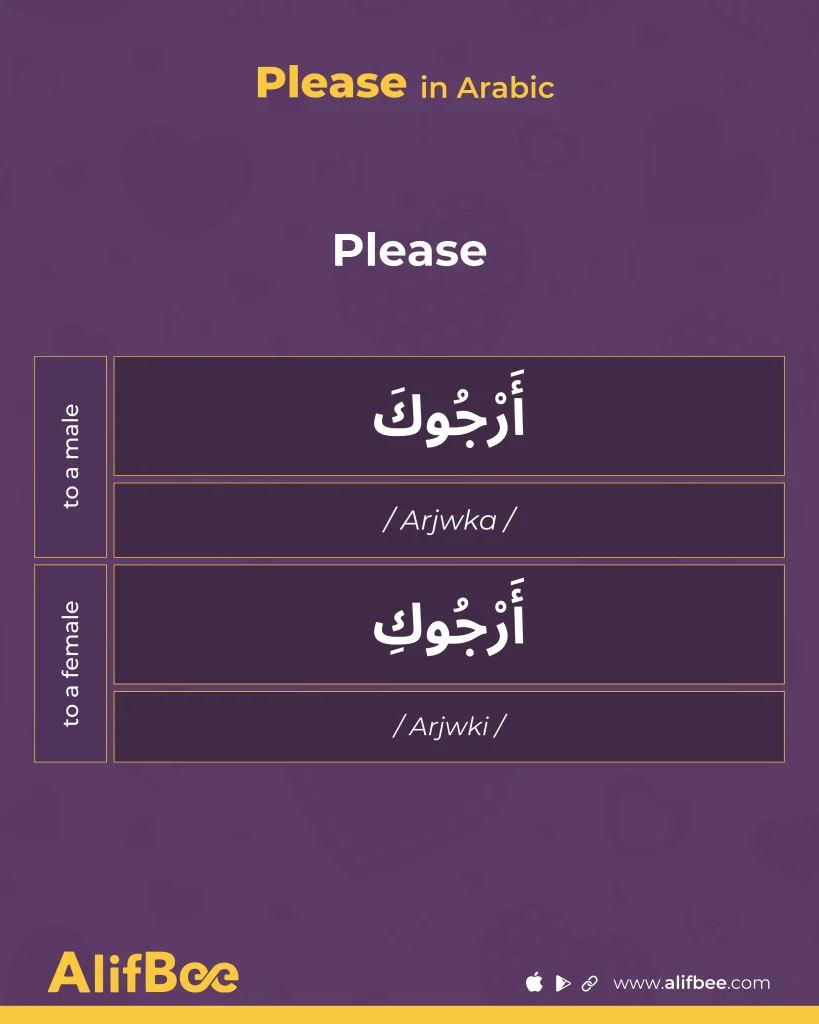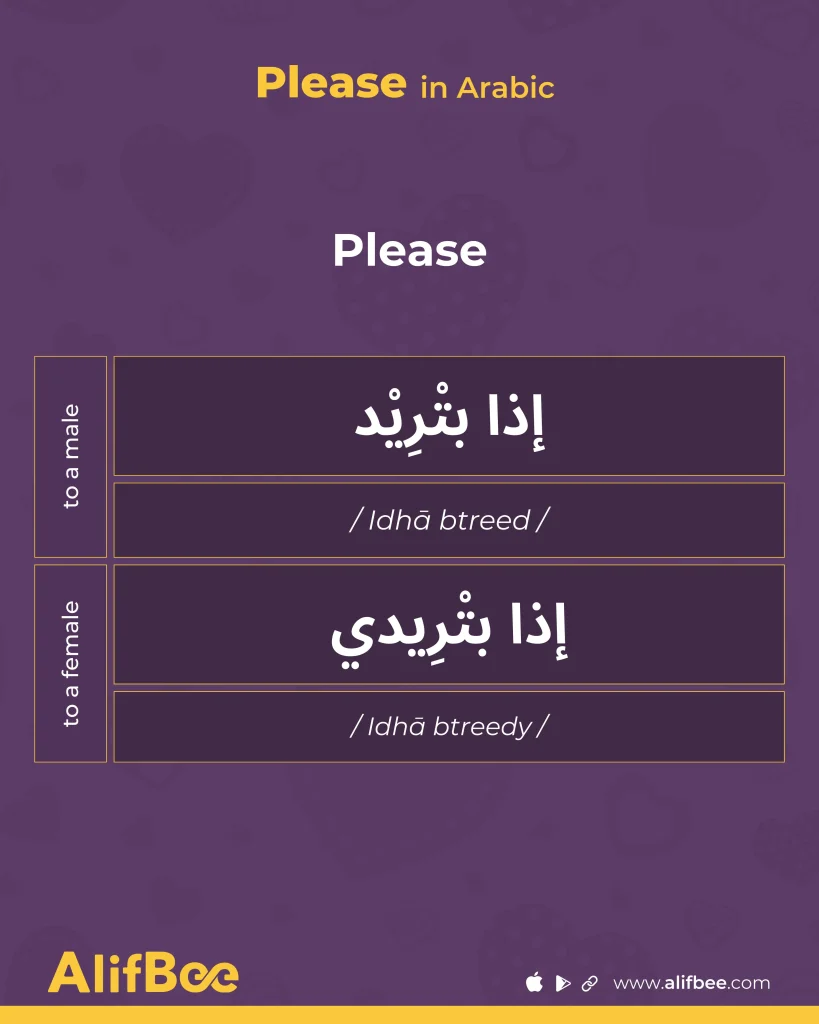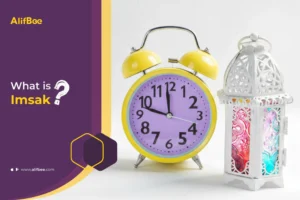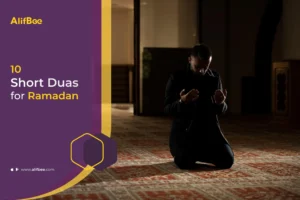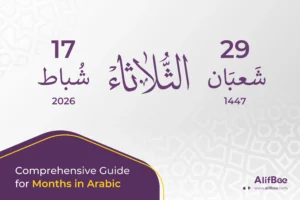The word “Please” should be one of the first words to learn when you start learning Arabic or any other language. It might seem like a small word, but it has a huge impact on your requests and can make your conversations more polite and friendly.
Being polite and respectful when making requests is part of Arabic culture. It shows that you have good manners. More importantly, it means you are kind and generous to the person you’re talking to. And of course, it makes it more likely for you to get what you want.
This is why it’s so important for Arabic learners to know how to say please in Arabic in a variety of ways for different daily scenarios early in their Arabic learning journey.
So, in today’s blog, I have brought you 7 polite and commonly-used ways to say please in Arabic in both casual and formal settings. Some of these Arabic phrases are informal and friendly, while others sound formal and elegant.
Are you ready to make your requests smoother?
Your Arabic Takeaway
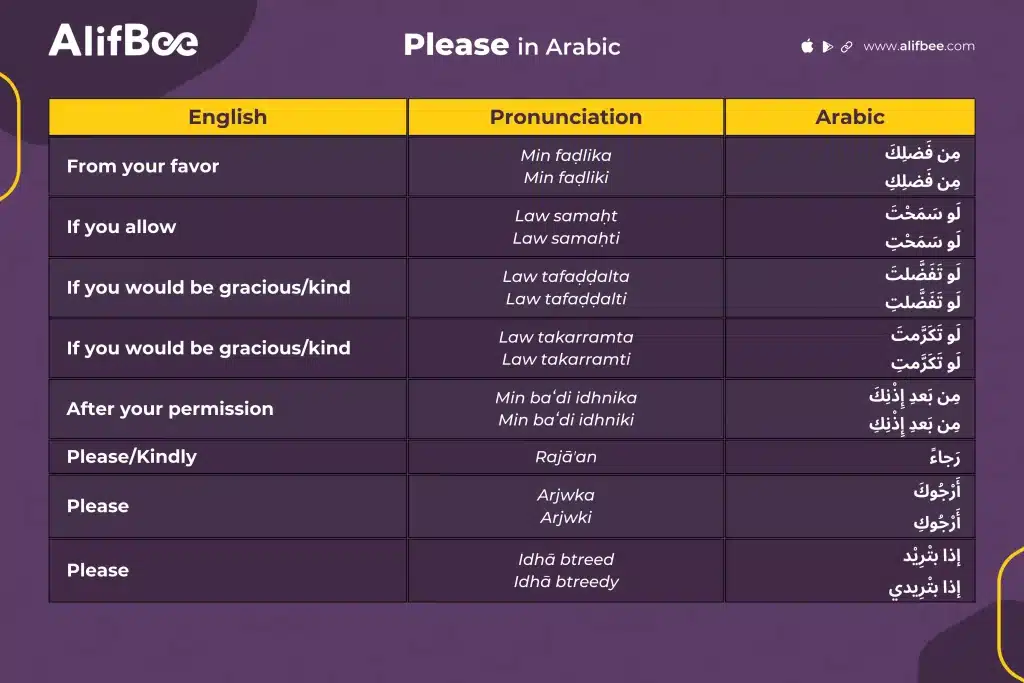
Why Learning to Say Please in Arabic Matters
It’s an essential expression that we need to use every now and then. Just like in any language, it is important to be polite and kind when talking to people. You don’t need to be advanced to learn these phrases, since they are simple, easy to remember, and will help you become fluent in Arabic.
Common Ways to Say Please in Modern Standard Arabic
Let’s start with the first phrase and notice how it changes depending on who we are speaking to: a male, a female, or a group.
Min faḍlika - مِن فَضلِكَ
English
Transliteration
Arabic
literal meaning: from your favor.
Please (to a male)
Min faḍlika
مِن فَضلِكَ
to a female
Min faḍliki
مِن فَضلِكِ
to a group
Min faḍlikum
مِن فَضلِكُم
Please, give me the pen
Min faḍliki, a‘ṭīnī al-qalam.
مِن فَضلِكِ، أَعْطِينِي القَلَمَ.
This is one of the most common ways to say please in Arabic. Its literal meaning is “from your favor”.
It’s common in formal and polite everyday Arabic and works in Modern Standard Arabic and many Arabic dialects.
Notice that in Arabic pronunciation, some words change depending on whether you are speaking to a male or a female. For example, Min faḍlika (مِن فَضلِكَ) is used when talking to a male, and Min faḍliki (مِن فَضلِكِ) is used when talking to a female. The root word stays the same; only the ending changes to match the person’s gender.
- The ending –ka (كَ) shows that you are speaking to a male.
- The ending –ki (كِ) shows that you are speaking to a female.
Notice the kasra under the last letter ك in the female form. This small vowel changes the ending from -ka to -ki and tells the listener that you are addressing a female.
Law samaḥt - لَو سَمَحت
English
Transliteration
Arabic
literal meaning: if you allow.
to a male
Law samaḥt
لَو سَمَحْتَ
to a female
Law samaḥti
لَو سَمَحْتِ
to a group
Law samaḥtum
لَو سَمَحْتُم
please, where is the library?
Law samaḥt, ayna al-maktaba?
لَو سَمَحْتَ، أَيْنَ المَكتَبَة؟
Law tafaḍḍalta - لَو تَفَضَّلتَ
English
Transliteration
Arabic
literal meaning: If you would be gracious/kind
to a male
Law tafaḍḍalta
لَو تَفَضَّلتَ
to a female
Law tafaḍḍalti
لَو تَفَضَّلتِ
to a group
Law tafaḍḍaltum
لَو تَفَضَّلتم
Please, write your name here.
to a female
Law tafaddalti, uktubī ismakī hunā
لَو تَفَضَّلتِ، اكْتُبِي اِسمَكِ هُنا
Law takarramta - لَو تَكَرَّمتَ
English
Transliteration
Arabic
literal meaning: if you would be so kind/generous
to a male
Law takarramta
لَو تَكَرَّمتَ
to a female
Law takarramti
لَو تَكَرَّمتِ
to a group
Law takarramtum
لَو تَكَرَّمتم
(Would you be so kind) Please, open the door.
Law takarramti, iftaḥī al-bāb.
لَو تَكَرَّمتِ، افتَحِي البَابَ
In phrases 2, 3, and 4, you can see that they all start with the same word /law/ which means ‘if’, and it is used to make requests softer. They all mean “please” (we mentioned the literal meaning in the table).
However, their literal meanings differ slightly. Let’s explain them only by one:
- Phrase 2: لَو سَمَحت means “if you allowed”, literally. It’s very common in spoken Arabic. It’s polite but a bit more casual than مِن فَضلِك. You may also hear it as /Iza Samaht/ إذا سمحت. Both expressions are correct and often used interchangeably. The same applies to لَو تَفَضَّلتَ and لَو تَكَرَّمتَ.
- Phrase 3: لَو تَفَضَّلتَ comes from the root ف-ض-ل, which means virtue, kindness, or favor. It sounds more formal and respectful and is often used when addressing elders, in customer service, or in formal settings.
- Phrase 4: لَو تَكَرَّمتَ comes from the root ك-ر-م, which means generosity. In polite everyday Arabic, it’s the same as saying “please”, “if you don’t mind”, or “if you would be so kind”. It also sounds formal and respectful.
Min baʻdi idhnika - مِن بَعدِ إِذْنِكَ
English
Transliteration
Arabic
literal meaning: After your permission.
to a male
Min baʻdi idhnika
مِن بَعدِ إِذْنِكَ
to a female
Min baʻdi idhniki
مِن بَعدِ إِذْنِكِ
to a group
Min baʻdi idhnikum
مِن بَعدِ إِذْنِكُم
With your permission, I will leave now.
Min ba‘di idhnika, sa’ughādiru al-ān.
مِن بَعدِ إِذْنِكَ، سَأُغادِرُ الآنَ
This means with your permission. It’s respectful, formal, but can also be used in everyday Arabic conversations.
Rajāʼan - رَجاءً
English
Transliteration
Arabic
· Please (in a more formal/written tone.)
· Kindly (casual/friendly (in some dialects)
Rajāʼan
رَجاءً
Please turn off your phone before the show
Rjāʼan, aghliqi alhātifa qabla badʼi alʻarḍi
رجاءً، أَغْلِقِ الهاتِفَ قَبْلَ بَدْءِ العَرْضِ
This phrase can be used in different ways. The first one is polite but shows clear requests. It is used in writings or announcements. It sounds firm, especially when asking people to follow rules like the example mentioned in the table.
It can also be casual and friendly in some Arabic dialects, like saying, for example,
Kindly have some tea with us.
رَجاءً، تَفَضَّلْ وَاشْرَبِ الشَّايَ مَعَنا
/Rajāʼan, tafaḍḍal wāshrabi alshshāya maʻanā/
Arjwka - أَرجوكَ
English
Transliteration
Arabic
Please (to a male)
Arjwka
أَرْجُوكَ
The common meaning of this Arabic word is “please” but depending on tone and context, it can feel like:
- Neutral: “I ask you”
- Polite: “Please”
- Emotional/urgent: “I beg you”
Now let’s look at the female and plural forms:
to a female
Arjwki
أَرْجُوكِ
to a group
Arjwkum
أَرْجُوكُم
Please don’t go
Arjwka, lā tadhhab
أَرْجُوكَ، لا تَذْهَبْ
Please listen to me.
Arjwki, ismaʻīnī
أَرْجُوكِ، اِسْمَعِينِي
As you can see in the examples, you can use this when you really want someone to do something, but depending on tone, it can sound pleading, desperate, or heartfelt. The first one is an emotional plea and the second sounds personal and direct.
Idhā btreed - إذا بتْريد
Most of the phrases mentioned above can be used in formal or informal settings. However, the following one can be heard mostly in everyday Arabic conversations in countries like Syria, Lebanon, Jordan, and Palestine.
English
Transliteration
Arabic
literal meaning: If you want
to a male
Idhā btreed
إذا بتْرِيْد
to a female
Idhā btreedy
إذا بتْرِيدي
As you can see in the examples, you can use this when you really want someone to do something, but depending on tone, it can sound pleading, desperate, or heartfelt. The first one is an emotional plea and the second sounds personal and direct.
Final word
We learned how to say please in Arabic in many situations, and what works in formal conversations, what to use when giving instructions, and finally what fits in everyday conversations.
For the best results, don’t hesitate to make these phrases part of your daily interactions when needed. Doing so can help you be kinder, more fluent in Arabic, and even more confident.
To continue learning Arabic, you can download our AlifBee App, a helpful assistant on your journey to mastering the Arabic language. Thank you for reading, and see you in our upcoming blogs.
And before you go, do you know how to say goodbye and thank you in Arabic?

